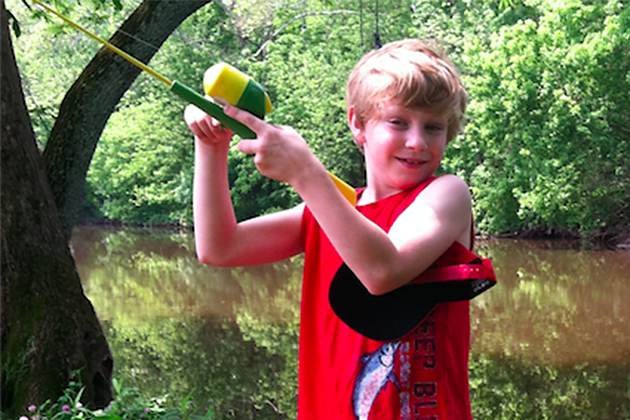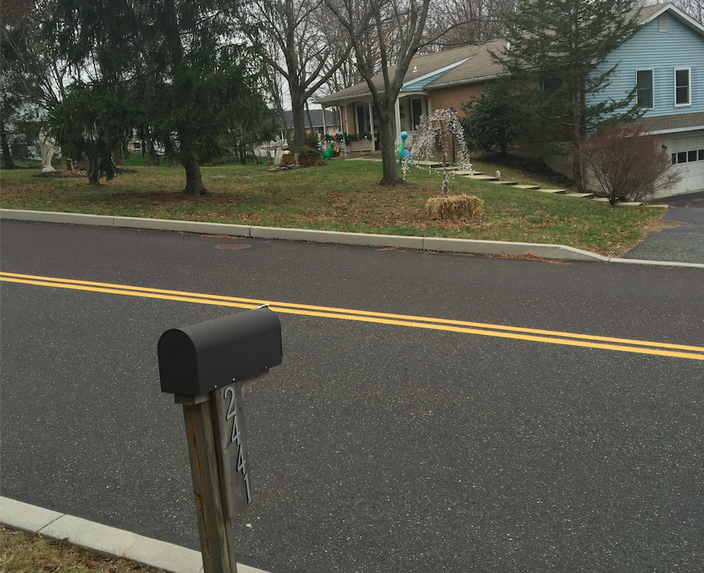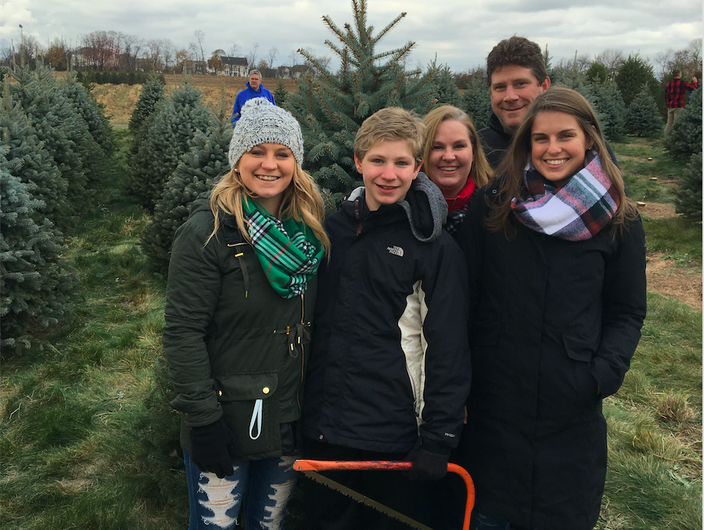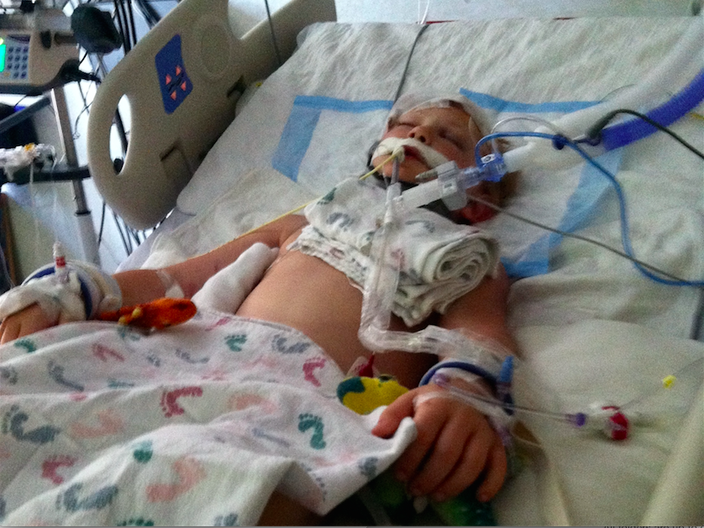
December 22, 2016
 Photo courtesy/Christine Bond
Photo courtesy/Christine Bond
In this photo taken before he was struck by a vehicle in 2012, Ciejay Bond holds a fishing rod. He sustained a traumatic brain injury in the incident. "It really is their lack of understanding for what Ciejay has endured," his mother says of the Boyertown Area School District, "their knowledge of brain injuries and lack of compassion for all of it that makes me advocate so intensely for him."
The last of two parts
When Ciejay Bond was struck by a car outside his family’s Montgomery County home, those at the scene didn’t think he would survive.
The 8-year-old boy survived serious brain trauma and injury, though. Now 13, he’s been through years of physical, occupational, speech and vision therapy.
He's fascinated by dinosaurs and enjoys swimming for a local club team.
And he loves going to school.
His parents, Mark and Christine Bond of Gilbertsville, don’t share his love for the Boyertown Area School District, which serves some 7,000 students in seven elementary schools, two junior high schools and a senior high school that covers portions of Montgomery and Berks counties.
That's because the sides have been at odds over making sure Ciejay gets a quality education, as mandated by state law.
He has an "Individualized Education Plan" that acknowledges the need for "support and accommodations" so he can stay in a regular classroom. An IEP, or document developed for every public school child who needs special education, is developed by a team that typically includes educators, a psychologist and the parents, and updated periodically.
Nearly five years after the pedestrian accident, Ciejay's brain injuries continue to present numerous academic hurdles, but the lapses between he and his peers have been bridged somewhat through extra support and attention.
What's become a sticking point between the sides is the requirement that he take the same physical education, or gym classes, as his peers. It is required to graduate, in fact.
With an elevated risk of serious injury, Ciejay's parents have pushed the district to revamp the phys ed curriculum for Ciejay to protect him and future students with similar brain injuries.
The district, they claim, hasn't bent as much as they'd like, and they suspect it's because of the inherent cost and effort involved in reinventing physical education across the district.
For the first time, the Bond family is publicly sharing their struggle; in a way, they hope to force the district's hand.
“We were trying to explain brain injuries to the school,” he said. “They were equating it to a learning disability, but a traumatic brain injury isn’t a learning disability. It’s a permanent disability.”
It's a one-sided story for now, as the district refused to comment for this story.
Every year, about 4,000 Pennsylvania children suffer moderate-to-severe traumatic brain injuries requiring hospital treatment. More than 20,000 children statewide annually sustain concussions, which are mild TBIs.
At the time of the accident, Ciejay was enrolled at a small, local Catholic school. His parents said the school was ill-equipped to provide the assistive services he needs.
Specifically, he needed access to BrainSTEPS, a brain injury school re-entry consulting program for children diagnosed with a traumatic brain injury.
Created by the state Department of Health in 2007 and implemented by the Brain Injury Association of Pennsylvania, it’s “considered a national model for brain injury education consulting” which aims to help students who “return to school with lingering effects that impact classroom performance.”
Since the program was created to help students like Ciejay, his parents decided to enroll him at the local public school, New Hanover Elementary, located about three miles from home. The process was slow.
“It took them over a year to have him evaluated for a program that the doctors were saying he needs to have,” said his mother, Christine.
"There are times that it bothers [Ciejay] but, all in all, his attitude toward that accident has been better than my attitude toward it.” – Mark Bonds, Ciejay's father
As Ciejay resumed his classwork, he faced reading issues.
“Every word he reads is new to him every time, even the word ‘the.’ Most kids learn sight words, but he wasn’t learning sight words because he was learning them over again every time he saw them,” said his father, Mark.
Spelling, and memory recall, also presented problems. Educators wanted him to learn to spell and memorize 20 new words, but knocked it down to 10 words when they realized his “processing speed is considerably lower" than his classmates, the Bonds said.
There were problems with math – remembering how he solved a problem, for example – and his eyesight.
“The school gave a vision test, and said nothing was wrong,” Christine said. “Basically, he could follow a pencil. That’s what they put in the report, that he could follow a pencil.”
The Bonds, however, knew there was a problem.
“He would bend over and not even see a wall there. We’d always say, ‘Ciejay, you have to watch what you’re doing, but he was essentially walking around with two toilet paper holders over his eyes. That’s all he could see.”
Visits to an ophthalmology specialist determined the problem: images in his left eye were being ignored by the boy's brain.
Outpatient therapy has improved the boy's left-eye vision, even as he seemingly favors his right eye as he reads today.
On the day he was struck by a car, Ciejay Bond walked across the street from his home to get the mail.
Still, Ciejay couldn’t take the PSSA standardized tests without someone reading the questions to him.
The Bonds say their efforts to ensure Ciejay could learn effectively at school didn’t resonate with educators at the elementary school in the years right after the accident nor at Boyertown Junior High East, where he is now in the seventh grade.
A litany of hearings before a state special education hearing officer ensued between family and school district that continues to this day. (The account of this battle comes solely from the family, as the school district declined comment on the situation.)
When the Bonds asked the district to provide a brain-injury expert, they said one wasn’t assigned.
When they asked for BrainSTEPS, that didn’t come to fruition immediately either, said Mark, who contends the program “works for the Department of Education, so there’s an automatic bias toward the schools.”
“This all ties back to the fact that they don’t understand the nature of Ciejay’s injuries. They have the resources at their fingertips to educate themselves, which they’ve failed to do.” – Mark Bonds
They represented themselves in many of the hearings, unable to afford an attorney.
The family provided PhillyVoice with a 34-page Special Education Hearing Officer’s report – for hearings held Oct. 1, 2015, Nov. 17, 2015, Jan. 11-12, 2016 and Feb. 18, 2016 – as evidence to support their concerns.
“What the administrative judge decides, that’s it. You can fight it, but only on appeal,” said Christine. “Appeals cost money and [the school district was] satisfied because the hearing officer said [Ciejay] been given an appropriate education even though he was in sixth grade, but reading at a beginning-of-fourth-grade level.”
Worried their son would fall so far behind he’d never catch up, the Bonds started taking him out of school for therapy four times a week.
“(We were) taking school materials and helping him learn those materials because the school wasn’t,” Christine said. “If he’d fail a test, (the school) would just give it to him again until he passed it."
“All they care about is if he’s passing the test, he’s fine,” Mark claimed. “We don’t know if they were reading it to him, guiding him to the right answers.”
Ciejay’s vocabulary grew from 53 to 61 words in the fourth grade, an achievement deemed “meaningful progress” by the elementary school despite the human brain’s general ability to remember an additional seven words a week, the Bonds said.
When he brought a writing journal home from school, it only had five or six written pages in it. Meanwhile, he’d come home with “beautiful drawings of dinosaurs or trains.”
“What was he missing when he was doodling?” Christine asked.
“That alone should speak volumes that something’s going on,” Mark said. “This all ties back to the fact that they don’t understand the nature of Ciejay’s injuries. They have the resources at their fingertips to educate themselves, which they’ve failed to do.”
The Bonds maintain their battle is focused on the district making sure Ciejay gets the support he needs and ensure the district wouldn’t be caught off guard in similar situations with students in the future.
It’s also about a general lack of understanding about the nature of brain injuries.
“Basically, they don’t want to change any of their curriculum or modify anything that they have to do because it means a change in their way of doing things. If they change it for Ciejay, they’ll have to change it for anybody in a similar situation,” he said. “But this isn’t a concussion protocol. This is entirely different, and they have nothing in place to support a student who has a brain injury. The teachers don’t even get it. They look at Ciejay and say, ‘Oh, he looks fine.’”
“I don’t like the fact that the school pits (Ciejay) against us. He sees them as a bunch of nice people, making his day fun. He doesn’t understand why we’re always angry." – Christine Bond
To a certain extent, he does.
“When you first look at him, you wouldn’t know anything ever happened,” said Christine. “He talks like a typical teenager. Walks like a typical teenager. Eats like a typical boy.”
“He eats like a horse,” her husband interjected.
“It’s one of those things you’d never know until you tried to talk to him in-depth,” said Christine.
“If you ask him something and he doesn’t know the answer right off the bat, you can see the wheels turning,” continued Mark. “Nine times out of 10, he’ll get the answer right, but something that takes a person a second or two might take him 10, 12 seconds, maybe more.”
On top of the mental processing delays, Ciejay has difficulty integrating socially with his peers at a time when the kid who lives across the street is pretty much his only close friend.
He knows that his traumatic brain injury means he is not like the other kids and that he may never be.
“He realizes that. He says it. That can be tough to hear,” said Mark. “Despite all that, he’s a happy kid. He knows his limitations. There are times that it bothers him but, all in all, his attitude toward that accident has been better than my attitude toward it.”
“I don’t like the fact that the school pits him against us,” Christine said. “He sees them as a bunch of nice people, making his day fun. He doesn’t understand why we’re always angry. He thought we were the ones being difficult, but he’s recently seen some of the things we’re talking about, and he’s come to realize that, ‘OK, maybe mom and dad have a reason to be angry.’”
Ciejay Bond (middle, holding a saw) was struck by a car in front of his Montgomery County home in 2012. Few thought he would survive his injuries, but now he's able to head out and cut down a Christmas tree with his family.
Ciejay won't be able to graduate unless he takes physical education, or gym class. That's particularly worrisome for his parents because gym class is ripe with potential for re-injury.
The sides are battling over adjusting the gym offerings to both welcome, and protect, him. Still, when the district yanked him from gym class rather than revamping it, Ciejay's parents were furious.
In that instance, the hearing officer sided with the Bonds, saying “the school definitely discriminated against him because he wasn’t allowed to participate in gym.”
“They took him out of gym because they wouldn’t adapt the gym class to enable Ciejay to participate,” said Christine. “Doctors gave all these restrictions to what he could and couldn’t do.
“Their answer was to remove him and just have him walk around the halls, or be in the gym with a teacher for 20 minutes," she continued. "The gym teacher complained because it cut into his lunch time and it wasn’t part of his contract. We came to call it ‘solitary gym.’
“If it was our choice, he wouldn’t be in gym at all, but it’s a requirement for graduation. I do not want to ever see him [reinjured and] in a hospital bed again. It would destroy us. We gave them the choice to take him out of gym, and they said no.”
“The Boyertown Area School district does not provide media responses regarding individual students.” – Lucy Kincade, office of the superintendent, Boyertown Area School District
The family provided a doctor's note so he could participate in gym, but it was rejected by the district, Christine says. They had another doctor's note prepared "and that doctor’s note wasn’t good enough.”
“Then, it was ‘we want him to do every activity we have and sign off on it,’” she contends. “We come to find out that this is so they could have someone to sue should anything happened to Ciejay at school. ‘Look, it’s the doctor’s fault.’ Transfer of liability. The rule of thumb after a brain injury is no contact sports, but we have a school saying ‘Ciejay could run into somebody in the hallway. Is that a hazard?'"
As a result of the hearing officer’s decision regarding discrimination, Ciejay was awarded some 147 hours of compensatory education for the educational therapies he needs to progress.
The Bonds claim the school district “wanted a divorce from us. They want Ciejay gone from the district.”
That’d be fine by them if there were other schools who would welcome him there despite his brain challenges. They don’t have the money for private schools, either. The protracted battle had taken a financial toll on the family.
“He’s come though all of this and this is what you want to do to him?” Christine said. “I’d love to sue the pants off them. I would have loved to sue the [driver] who hit our son, but the laws don’t allow it. Somehow, the law keeps working against us and Ciejay, and it makes no sense.”
Boyertown Junior High East on Big Road in Gilbertsville, Montgomery County,
PhillyVoice sought comment from the school district about the Bonds’ claims; a one-sentence response was provided from the superintendent’s office. It read:
“The Boyertown Area School District does not provide media responses regarding individual students.”
But a June email from the school district’s attorney to the Bonds' then-attorney – as the sides worked to find some common ground for the school year that started in September – offers some insight, however.
In the email, Jennifer Donaldson of the Sweet Stevens Katz Williams firm of New Britain, Bucks County painted Ciejay’s parents as uncooperative in providing medical records. They say that was born from frustration of the years-long battle.
“The parents have been very clear that they will not cooperate with any of these requests and will not share any current medical information with the District.” – school district attorney Jennifer Donaldson wrote in a June email
“The parents have been very clear that they will not cooperate with any of these requests and will not share any current medical information with the District,” Donaldson wrote, noting that while “the district does not want to enter into more litigation with the parents,” it would do so if necessary.
An email seeking comment from Donaldson last month went unreturned.
But the only reason the Bonds can tell their story, Christine says, is because they refused to sign off on those, and other, documents. As a side note, she mentioned that "I shared the hospital photos with the school and they had no reaction or comments to them. It's one of the things that made my determination greater."
"It really is their lack of understanding for what Ciejay has endured, their knowledge of brain injuries and lack of compassion for all of it that makes me advocate so intensely for him," she added.
In October, a physical therapist from Theraplay – one of Ciejay’s therapy providers – wrote a letter to correct the record presented by the district in the gym-class debate.
“We cannot endorse Ciejay’s participation in gym class, but would be happy to review additional plans from the school for modifications and adaptations for his safe participation in scheduled activities,” it read.
Then, on December 8, the parents and administrators met yet again about Ciejay’s IEP. It did not go well.
According to Ciejay’s parents, the district emailed a recommended IEP but a different version of the plan was distributed at the meeting for consideration.
“We insisted on using the emailed version and the principal got angry and ended the meeting, calling me rude and telling me he was sick of me and my rudeness,” she said. “The principal told me he had the power to make me leave."
The Bonds left before they were forcibly removed from the school.
Ciejay Bond, in the hospital after being struck by a car in Gilbertsville, Montgomery County.
The school has adapted some physical education classes for Ciejay.
Tennis classes went from doubles to singles to cut down on the risk of injury. Still, Mark said, “they haven’t told us what they plan to do when it comes time for flag football, or volleyball in a gym not big enough for three games going on and 72 kids playing.”
Mark and Christine Bond now worry that the clock is working against them.
"He’s our miracle, but the challenges we’ve have to face afterwards are just devastating because of the lack of information and knowledge out there." – Christine Bond
“He has three years left for modifications to be made to formally benefit him,” said Christine. “After that three years, it becomes exponentially more difficult to learn new things, to think abstractly and do all the things that adults do without even paying attention to it. Doctors are telling us we have three years to get these things fixed. Otherwise, it might not every happen.”
They’d move to get into another private school if they could afford it.
As things stand, Christine is content to put the district on blast.
“All of these people in this community need to know that this is what they’re doing with students as brain injuries become more and more common,” Christine said. “The knowledge of them is expanding, and this district just doesn’t want to deal with them.”
She conceded, however, that this something new for the district.
“We asked how much experience they had (with these types of situations), and they said none. Ciejay, to best of our knowledge, is only one,” she said. “The problem is that he should never have made it back in school with the injuries he has. He shouldn’t be here, period. He’s our miracle, but the challenges we’ve have to face afterwards are just devastating because of the lack of information and knowledge out there.
“All the money they’ve spent on lawyers fighting us could have been spent on Ciejay," she continued. "They’re fighting us over a child who shows more character and compassion than the public officials at the school district. He has a future, they just can't see it.
"The God I know saved Ciejay to have a purpose, and I know that purpose cannot be found without an education."
 Courtesy of Christine Bond/for PhillyVoice
Courtesy of Christine Bond/for PhillyVoice Photo courtesy/Christine Bond
Photo courtesy/Christine Bond Google/StreetView
Google/StreetView Courtesy of Christine Bond/for PhillyVoice
Courtesy of Christine Bond/for PhillyVoice